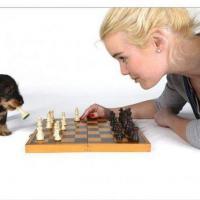
Cute Little Beasts. Part Four.
Those of you my dear readers who were patient enough to read through Parts 1-3 of this series might be asking : 'Well Mr. Serper, what's your point? You showed us that the kids are generally good in chess, so what? I knew it anyway!" Please bear with me and read the final installment of this article. Here I want to discuss what could be a good way to deal with these little monsters.
It is a very popular (and correct) belief that kids are good in tactics and therefore most adult players try to avoid sharp positions and preferably get their young opponents into endgames. This is a valid strategy... if you are a Master or a Grandmaster! But since the majority of my readers are not professional chessplayers I would warn you against doing this. First of all, endgame technique is notoriously the weakest spot of most club players who don't have the time (and in most cases the desire) to spend studying something that can be very dry and sometimes even boring. Therefore your advantage in the endgame against a kid won't be that huge. But the biggest problem is that if the game lasts 50-60 moves, it is 50-60 opportunities for your little adversary to unleash some vicious tactic, especially when you get tired or bored in the endgame. So, let me recommend to you a completely different approach. Sometimes counterintuitive things are the best. For example how many times have I heard this common logic from the average club players: "Tomorrow I am playing a Master (Grandmaster) who obviously knows openings better then me, so I am going to surprise him with some obscure side line, so he won't be able to use his superior opening preparation!" Sounds very logical, right? Now let me quote GM Alex Yermolinsky from his excellent book "The Road to Chess Improvement".
"I will reveal a little secret: there is nothing I want more from my opponent than to step away from main-line theory. Go ahead, surprise me, throw me off balance, make me think on my own- any way you call it- but there is a catch. You give me a good position after the first 10 moves with plenty of pieces on the board, and I'll find a way to outplay anybody 300 rating points below me."
As you can see, the most obvious things are not always the best indeed! (I talk more about this subject in my article "Do the opposite!" here: http://www.chess.com/article/view/do-the-opposite)
But let's get back to our subject. In order to maximize you chances to succeed against a kid you should try to take advantage of two typical flaws all youngsters have to some degree.
1) When kids play a game of chess (or do pretty much anything for this matter!), for them it's all about 'Me!, Me!!,Me!!!'. Only later when they get more mature and/or get a lot of hard-knock lessons, they realize that you need to actually pay attention to your opponent's ideas. (For more on this topic see my article "An important lesson from my youth" here: http://www.chess.com/article/view/an-important-lesson-from-my-youth)
2) All kids like to attack, almost noone likes to defend!
Therefore a sound strategy could be just the opposite to what you might expect: go for complications and try to attack whenever possible! In many cases young Mr.-Future-World-Champion will either miss your threats being too busy with his own Grand Ideas or won't be able to find the best defense because he simply doesn't yet know how to do it.
Let's test your newly-acquired skills. In all the following games you are playing against a young genius, so it is your only chance to beat him before he becomes too strong!
(Just like in most of my articles I give you a chance to test your skills, so the games are given as a Quiz. Please remember that you can always replay the whole game from the first move if you click "Solution" and then "Move list".)
Test #1. Crush 11-year old Boris Spassky!






